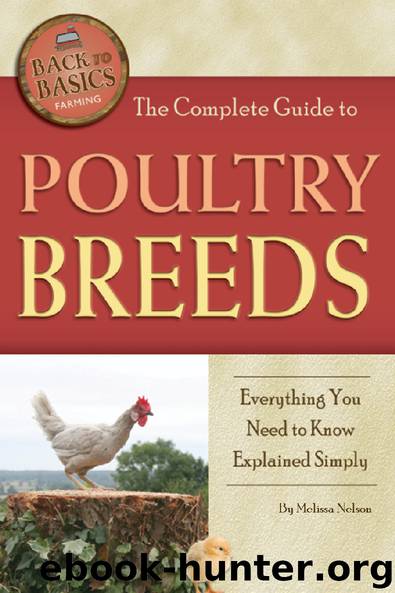The Complete Guide to Poultry Breeds: Everything You Need to Know Explained Simply by Melissa Nelson

Author:Melissa Nelson
Language: eng
Format: epub
Tags: poultry, breeds, plans, chickens, turkeys, ducks, husbandry, eggs, meat
Publisher: Atlantic Publishing
Published: 2012-04-23T00:00:00+00:00
Heritage Breed Preservation
For a domesticated turkey to be “heritage,” it must contain some historical characteristics that modern commercial turkeys lack. The American Livestock Breeds Conservancy has determined the following criteria in order to determine if a turkey is a heritage turkey:
• The heritage turkey must mate naturally, even when the bird is bred for genetic maintenance. A heritage turkey should have fertility rates of 70 to 80 percent.
• The sexual productivity of a heritage turkey must last for several years; hens should lay eggs for five to seven years and breeding toms should breed for three to five years.
• The heritage turkey must have a slow- to- moderate growth rate — usually 36 to 28 weeks. A slower growth rate allows the bird’s body time to develop a strong skeleton and healthy organs.
As a turkey producer, you may find a special niche in breeding and maintaining a flock of heritage turkeys. Since the broad-breasted white and the broad-breasted bronze turkeys require artificial insemination to reproduce, most backyard and small-flock turkey owners will not have the skill to perform this procedure. A heritage turkey will be able to breed naturally and will not have the heart and leg problems associated with the two commercial breeds of turkeys.
The Heritage Turkey Foundation ( www.heritageturkeyfoundation.org ) is an organization founded to protect the surviving heritage turkey strains and reintroduce them to the American marketplace. Their focus is to encourage farmers to raise heritage turkey breeds and promote the turkeys in the marketplace and to consumers. First, these breeds should be preserved for genetic reasons. Commercial turkeys are susceptible to health problems that could be catastrophic for the entire industry. The gene pool is small, making one disease more likely to wipe out an entire population of turkeys. Second, preserving heritage turkeys can also benefit consumers. A slow growth rate gives heritage breeds a flavor not available from a commercially produced turkey. Although this meat may be more expensive, these breeds are more flavorful and worth the investment.
Table of Contents
Download
This site does not store any files on its server. We only index and link to content provided by other sites. Please contact the content providers to delete copyright contents if any and email us, we'll remove relevant links or contents immediately.
Craft Beer for the Homebrewer by Michael Agnew(18235)
Marijuana Grower's Handbook by Ed Rosenthal(3676)
Barkskins by Annie Proulx(3367)
Project Animal Farm: An Accidental Journey into the Secret World of Farming and the Truth About Our Food by Sonia Faruqi(3212)
Red Famine: Stalin's War on Ukraine by Anne Applebaum(2928)
The Plant Messiah by Carlos Magdalena(2926)
0041152001443424520 .pdf by Unknown(2843)
Organic Mushroom Farming and Mycoremediation by Tradd Cotter(2688)
In the Woods by Tana French(2584)
Beer is proof God loves us by Charles W. Bamforth(2452)
7-14 Days by Noah Waters(2409)
Between Two Fires by Christopher Buehlman(2309)
Borders by unknow(2301)
Reservoir 13 by Jon McGregor(2300)
Meathooked by Marta Zaraska(2255)
The Art of Making Gelato by Morgan Morano(2251)
Birds, Beasts and Relatives by Gerald Durrell(2216)
The 7 Habits of Highly Effective People: Powerful Lessons in Personal Change (25th Anniversary Edition) by Covey Stephen R(2189)
The Lean Farm Guide to Growing Vegetables: More In-Depth Lean Techniques for Efficient Organic Production by Ben Hartman(2134)
